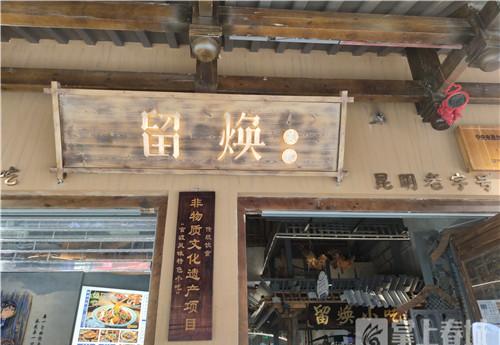In the streets of Guandu Ancient Town, if you are tired of walking, you can stop and eat a bowl of pea flour from Zhang Liuhuan's family. It's a familiar taste that burns on your taste buds and is engraved in your memory, and this little bowl of pea flour in your hand is not only a traditional snack listed in intangible cultural heritage, but also the beginning of a four-generation story.

"The thinner the pea flour, the more flavorful it becomes." While speaking, Zhang Liuhuan demonstrated to reporters. Pea flour, which has been soaked in juice, is already secreting saliva just by looking at it. Chew a mouthful, smooth and tender, sour and spicy appetizer, while eating while making a "sneaky" sound, as if to put in the secret sauce what condiments are listed one by one, this is the best time for pea flour to eat.
At the beginning of the last century, Zhang Liuhuan's grandmother carried a flat burden every day to set up a stall on the street, starting only in Xiaobanqiao, and then walking the streets and alleys, leaving footprints in many places. Zhang Liuhuan introduced, "At that time, I only sold some pea flour, my grandmother began to prepare materials at six o'clock in the afternoon the first day, and by about eleven o'clock, she was all ready, and then went out to set up a stall at five o'clock in the morning the next day." "Except for the windy and rainy weather, nothing can stop her from going out. In this way, it has persisted for decades, and it has also been considered to have explored an exclusive craft and won the recognition of the local people.
The reputation of pea flour is getting better and better, and Zhang Liuhuan's grandmother's good craftsmanship has also been inherited and passed on to his father. A flat shoulder went to the Victory Bridge, and then to the stone bridge shop, this craft is still carried on the shoulders, followed by her mother and sister, walking through the streets of old Kunming. It was not until the 1980s that the "flat snacks" that had been "living in the middle of nowhere" finally made a home near Yunnan University, and it was ten years after it was "settled". Zhang Liuhuan was very emotional, "At that time, I was only 16 years old, learning the craft from my father and mother, and slowly passing it down. ”
By Zhang Liuhuan's generation, the reputation of snacks has become much louder than before. In 2004, Zhang Liuhuan returned to his hometown and continued the family inheritance in the form of a farmhouse. "At that time, more things were sold and the traffic was greater, with no less than seven or eight hundred people a day." It was not until two years later that these decades of inheritance of craftsmanship officially "settled" in Zhuangyuan Street, named after her, becoming a synonym for guandu traditional snacks.
With the passage of time, this bowl of "pea flour" has passed to Zhang Liuhuan's daughter, who is committed to spreading the taste of old Kunming to a wider world. At first, Zhang Liuhuan did not agree with her daughter's move, believing that she should keep her "one acre and three points of field" and ensure that when each bowl of snacks is delivered to the diners' table, both in taste and in size, it must be the same as that made by her grandmother. But her daughter convinced her with one word: inheriting culture also needs to keep pace with the times, not only to inherit, but also to innovate.
After four generations of inheritance, from the street food sold in the streets by a flat shoulder and a cart at the beginning of the last century, to the modern restaurants with standardized and standardized operation today. This taste, which has been passed down for hundreds of years, relies on real materials, is ingenious, and is a gastronomic skill passed down from generation to generation. "Guandu Taste" not only records the changes of an era, but also carries a thick memory that belongs to Kunming people.
Pocket Spring City intern reporter: Zhang Die, Ma Mili
Editor-in-charge: Fan Tingting
Editor: Zhou Xiaoxue
Final Judge: Qian Hongbing